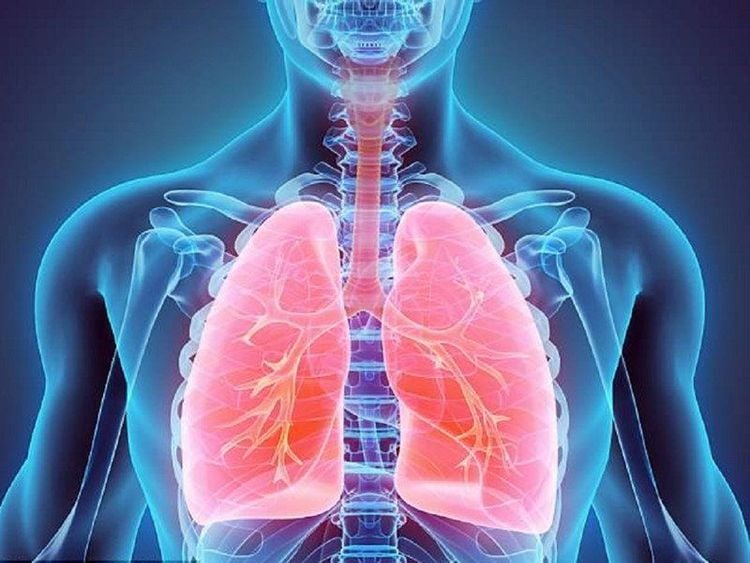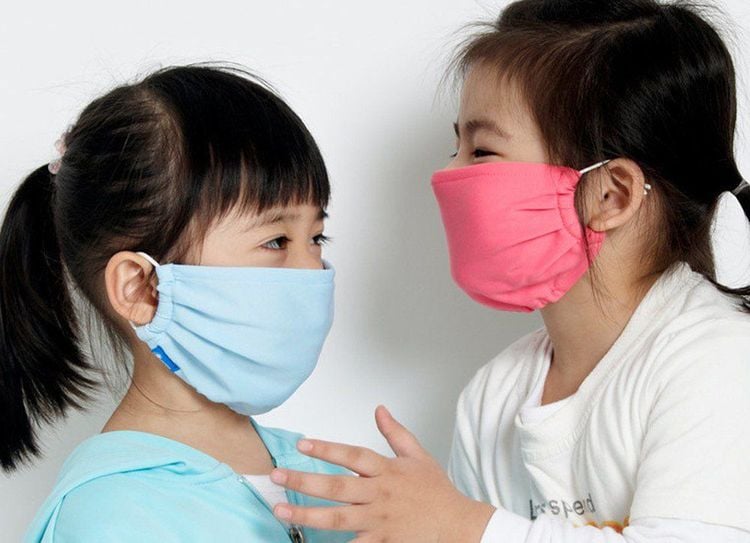This is an automatically translated article.
The article is professionally consulted by Master, Doctor Nguyen Huy Nhat - Department of Medical Examination & Internal Medicine - Vinmec International General Hospital Da Nang.The time of season change is a favorable time for viruses and bacteria to multiply and develop. They can enter the body and cause serious illnesses, including bronchitis. Many people wonder, is bronchitis contagious?
1. What is bronchitis?
Bronchitis is an inflammation and swelling of the lining of the bronchial tubes in the lungs. Bronchitis usually has two main types, including:Acute bronchitis : within a few days, the condition will improve, but the cough can continue for up to a week. Chronic bronchitis: is a relapsing disorder, often repeated over and over again. Symptoms of this stage are a cough with phlegm for at least 3 months or even years in a row. When the disease persists and recurs over a long period of time, it can lead to chronic obstructive pulmonary disease (COPD).

2. Causes of bronchitis
Bronchitis is usually caused by a virus, which occurs after cold or flu symptoms. Some other causes of bronchitis include chemical contamination, infections, vapors, dust, and pollutants from the surrounding environment that cause irritation of the bronchial passages. In particular, people who regularly smoke or who have lung problems, such as asthma, chronic bronchitis or cystic fibrosis are more likely to develop the disease.3. Symptoms of bronchitis
People with acute and chronic bronchitis often have the following signs and symptoms:Throat with phlegm of various colors such as white, yellow or green (rare). Shortness of breath or wheezing Fatigue Fever and chills Chest tightness Persistent cough If you experience any of the symptoms mentioned above, you should visit reputable medical centers or clinics for a diagnosis and treatment. timely treatment.
4. Is bronchitis contagious?

Although chronic bronchitis is not contagious, your airways will be inflamed for a long time with symptoms that last for at least three months and may recur after 2 years. This recurrence can lead to chronic obstructive pulmonary disease (COPD) and other serious complications.
5. How is bronchitis spread?
It is no coincidence that bronchitis has become a common disease in the respiratory tract, because the virus that causes the disease is the syncytial virus (RSV). This virus is very easy to spread and spread, even if not strictly controlled and treated in time, it can develop into an epidemic. Usually there are two main ways of causing disease, including:Direct person-to-person transmission through contact: If you come into direct contact with someone with bronchitis or live in an epidemic environment, the risk infection will be very high. The syncytial virus is usually transmitted from person to person through respiratory secretions such as coughing, sneezing, shaking hands, or being inhaled while talking to an infected person.

6. Disease stages of people infected with bronchitis
Incubation period: The incubation period in an infected person usually lasts from 1 to 3 days after contact with a droplet containing a respiratory virus that causes bronchitis in an infected person. During this stage, the infected person has almost no symptoms.Upper respiratory tract inflammation stage: Typical symptoms can be easily encountered such as sore throat, sneezing, runny nose accompanied by low-grade fever, body aches and fatigue. During this period, the sick person is very infectious to others because they spread many disease-causing viruses into the environment.
Stage of acute bronchitis: Some common symptoms in infected people in this stage are cough, dry cough, cough with phlegm. The phlegm of people with bronchitis has different colors, it can be milky white, yellow or blue. Even worse, the sick person can cough up blood along with a burning pain behind the breastbone when coughing.
Recovery phase: After being infected, symptoms will subside and recover over a period of 7-10 days. However, for people with weak resistance due to a weakened immune system, the disease can continue for a long time with more serious symptoms such as dry cough, cough with phlegm, ..

7. How to prevent bronchitis
Bronchitis is a highly infectious disease that can even form an epidemic area if timely preventive control measures are not taken. Here are some measures to help prevent bronchitis effectively:Create a clean environment: You should keep the air in your house warm but not too hot and stuffy. clean, cool to prevent the growth of bacteria and mold. In addition, you should regularly clean and sanitize your accommodation, always keep your hands, feet, teeth, and mouth clean.
Limit contact with sick people: To avoid being infected with the virus from sick people, it is best to limit contact with people who have symptoms such as cough, runny nose. Avoid holding and shaking hands with the sick person. In addition, you should wear a medical mask when going out on the street, especially in public places and during the change of seasons - favorable for the growth and development of bacteria. If a family member has a cold, you should let the sick person use their own household utensils such as bowls, cups, cups, chopsticks,... Bathrooms and dining tables are also places where bacteria can breed, you should Clean them regularly to prevent the possibility of infection.
Apply a reasonable diet: Fresh vegetables and fruits are considered "effective assistants", very good support for the prevention and treatment of most diseases today. Therefore, you should increase the addition of green vegetables, fresh fruits and nutrient-rich foods in your daily meals. Limit eating spicy, hot, greasy foods and do not use stimulants such as alcohol, tobacco to ensure that the bronchi and lungs are always healthy.
Exercise regularly: Along with building yourself a healthy diet, you should also actively exercise regularly with a certain frequency. However, avoid over-exercising, so exercise should be mixed with rest in a reasonable manner.
Vinmec International General Hospital is the address for the treatment of respiratory diseases, including bronchitis, with a team of highly specialized doctors, a system of modern equipment, specialized examination and consulting services. Karma; civilized hospital space, polite and maximum sterilization.
Doctor Nguyen Huy Nhat has many years of experience in the field of respiratory disease treatment at Hue Central Hospital, Hoan My General Hospital, .. before being a doctor of General Internal Medicine Department of General Hospital. Vinmec Danang International.
If you notice any unusual health problems, you should visit and consult with a specialist.
Please dial HOTLINE for more information or register for an appointment HERE. Download MyVinmec app to make appointments faster and to manage your bookings easily.
Reference source: Webmd.com













